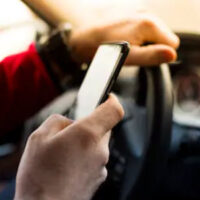How Does Florida’s New Cell Phone Law Affect Distracted Driving Claims?

Before July 2019, Florida had one of the weakest cell phone laws in the country. It only applied in limited situations, and officers could not issue citations unless they pulled drivers over for something else.
But that was before the new limited hands-free law took effect. In most cases, the law prohibits texting and driving. In this context, “texting” means sending or reviewing any form of text-based communication, including text messages, social media posts, and emails.
The new law gives Tampa personal injury lawyers an additional tool to obtain compensation in inattentive driving cases. This compensation usually includes money for economic losses, such as medical bills, and noneconomic losses, such as pain and suffering.
What is Distracted Driving?
Inattentive motorists cause thousands of serious injury crashes every day. Scientifically, distracted driving could be any of the following:
- Taking one’s hand off the wheel (manual distraction),
- Taking one’s mind off driving (cognitive distraction), or
- Taking one’s eyes off the road (visual distraction).
Note that hand-held cell phones involve all three types of distractions. Hands-free phones are not much better. They are visually and cognitively distracting. Furthermore, these gadgets give many drivers a false sense of security.
Legally, distracted drivers are liable for damages if they violate a safety law or fail to use ordinary care, as outlined below.
Inattentive Driving and Negligence Per Se
If a motorists texts, drives, and causes a car crash, the negligence per se doctrine usually applies. Tortfeasors (negligent drivers) are presumably negligent if:
- They violate a non-penal safety law, like the cell phone or speeding law, and
- That violation substantially causes a vehicle collision.
Additional evidence of negligence includes things like erratic driving or multiple text messaging episodes immediately prior to the crash.
If the tortfeasor violated a penal safety law, like the DUI law, and caused a crash, the tortfeasor may be liable for damages as a matter of law. No further evidence is necessary.
Many jurors award higher damages in negligence per se claims. So, these cases are not just easier to prove in court, it also could mean additional compensation.
Distracted Driving and Ordinary Negligence
In all other inattentive driving claims, victim/plaintiffs must use circumstantial evidence to establish a lack of ordinary care.
Let’s return to the hands-free example. It is legal to use these gadgets. And, mostly because of marketing campaigns, many Hillsborough County jurors believe that “hands-free” means “risk-free.” But they often change their minds when they hear evidence about the distracting qualities of hands-free devices.
The device use must be a lack of ordinary care. If a driver glances at a hands-free phone to decline a call, most jurors would probably not consider that negligent. But if the tortfeasor used the device steadily, such as a GPS navigation app, that’s a different story.
Partner with Dedicated Lawyers
Distracted drivers often cause serious injuries. For a free consultation with an experienced personal injury attorney in Tampa, contact The Matassini Law Firm, P.A. Our attorneys can connect car crash victims with a reputable doctor even if they have no insurance or money.
